社会工作导论英文版
- 格式:ppt
- 大小:228.00 KB
- 文档页数:8
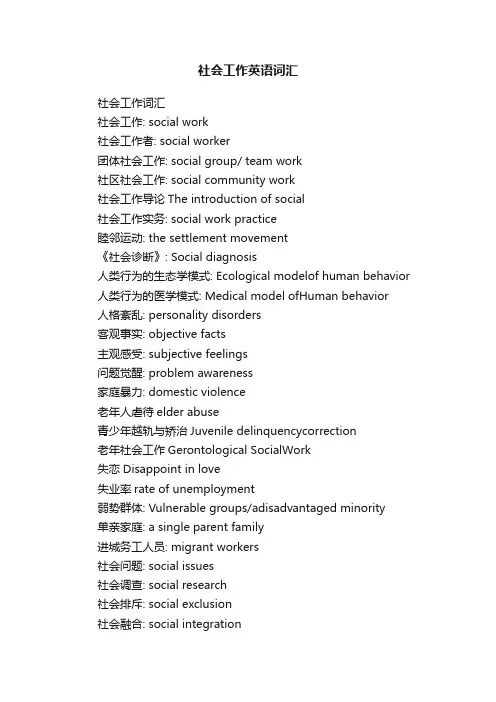
社会工作英语词汇社会工作词汇社会工作: social work社会工作者: social worker团体社会工作: social group/ team work社区社会工作: social community work社会工作导论The introduction of social社会工作实务: social work practice睦邻运动: the settlement movement《社会诊断》: Social diagnosis人类行为的生态学模式: Ecological modelof human behavior 人类行为的医学模式: Medical model ofHuman behavior人格紊乱: personality disorders客观事实: objective facts主观感受: subjective feelings问题觉醒: problem awareness家庭暴力: domestic violence老年人虐待elder abuse青少年越轨与矫治Juvenile delinquencycorrection老年社会工作Gerontological SocialWork失恋Disappoint in love失业率rate of unemployment弱势群体: Vulnerable groups/adisadvantaged minority单亲家庭: a single parent family进城务工人员: migrant workers社会问题: social issues社会调查: social research社会排斥: social exclusion社会融合: social integration社会救助: social assistance社会福利: social welfare功能主义: functionalist perspective机械团结: mechanical solidarity有机团结organic solidarity社会学概论: Introduction to Sociology社会调查的理论与方法Theories&Methods for Social Investigation 社会调查方法Methods for social Investigation 社会统计学Social statistics社会问题研究Research on SocialProblems社会心理学Social psychology社会学概论Introduction to Sociology社会学简论Brief Introduction toSociology社会学理论专题Current issues inTheories of Sociology社会学问题研究Research on problems ofSociology社会学研究方法Research methods ofSociology社会学Sociology社会保障social security社会福利制度the social welfare system社会公德social morality社会学概论Introduction to Sociology社会工作概论Introduction to socialWork社会调查与研究方法Social Survey&Research method 社会政策Social policy文化人类学Cultural anthropology人口社会学Sociology of Population农村社会学Rural sociology城市社会学Urban Sociology家庭社会学Sociology of Family发展社会学Sociology of Development经济社会学Economic Sociology组织社会学Sociology of organization文化社会学Cultural sociology宗教社会学Sociology of Religion教育社会学Sociology of education西方社会思想史History of Western贫困与发展Poverty and Development专业英语English for Sociology社会学专题讲座Issues of Sociology民俗学Folklore studies社会问题Social problems科学社会学Sociology of education文化社会学Cultural sociology历史社会学Historical Sociology政治社会学Political sociology法律社会学Sociology of law环境社会学Sociology of environment公共关系Public relations团体工作Group Work社区工作Community Work社会工作实习Practice of Social Work社会性别研究Gender Studies家庭社会工作Family Social Work临床社会工作Clinical social Work社会立法Social legislation社区服务Community services心理咨询Psychological Counseling整合社会工作实务Integrative SocialWork practice 社会工作专业英语English for SocialWork保险与信托Insurance and Entrustment教学实习Teaching Practice管理学Management Theory社工俱乐部social workers club独立安置Independent placements公开领养0pen adoption《领养与安全家庭法案》Safe familiesact。
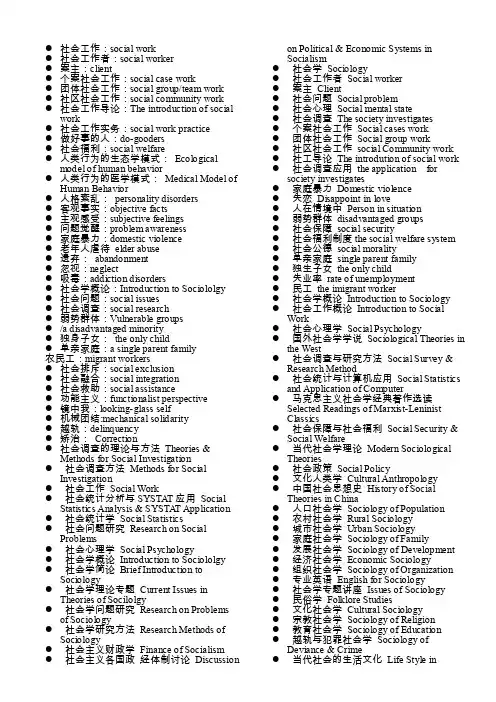
●社会工作:social work●社会工作者:social worker●案主:client●个案社会工作:social case work●团体社会工作:social group/team work●社区社会工作:social community work●社会工作导论:The introduction of socialwork●社会工作实务:social work practice●做好事的人:do-gooders●社会福利:social welfare●人类行为的生态学模式:Ecologicalmodel of human behavior●人类行为的医学模式:Medical Model ofHuman Behavior●人格紊乱:personality disorders●客观事实:objective facts●主观感受:subjective feelings●问题觉醒:problem awareness●家庭暴力:domestic violence●老年人虐待elder abuse●遗弃:abandonment●忽视:neglect●吸毒:addiction disorders●社会学概论:Introduction to Sociololgy●社会问题:social issues●社会调查:social research●弱势群体:Vulnerable groups●/a disadvantaged minority●独身子女:the only child●单亲家庭:a single parent family农民工:migrant workers●社会排斥:social exclusion●社会融合:social integration●社会救助:social assistance●功能主义:functionalist perspective●镜中我:looking-glass self●机械团结:mechanical solidarity●越轨:delinquency●矫治:Correction●社会调查的理论与方法Theories &Methods for Social Investigation●社会调查方法Methods for SocialInvestigation●社会工作Social Work●社会统计分析与SYSTA T应用SocialStatistics Analysis & SYSTA T Application ●社会统计学Social Statistics●社会问题研究Research on SocialProblems●社会心理学Social Psychology●社会学概论Introduction to Sociololgy●社会学简论Brief Introduction toSociology●社会学理论专题Current Issues inTheories of Socilolgy●社会学问题研究Research on Problemsof Sociology●社会学研究方法Research Methods ofSociology●社会主义财政学Finance of Socialism●社会主义各国政,经体制讨论Discussionon Political & Economic Systems inSocialism●社会学Sociology●社会工作者Social worker●案主Client●社会问题Social problem●社会心理Social mental state●社会调查The society investigates●个案社会工作Social cases work●团体社会工作Social group work●社区社会工作social Community work ●社工导论The introdution of social work ●社会调查应用the application forsociety investigates●家庭暴力Domestic violence●失恋Disappoint in love●人在情境中Person in situation●弱势群体disadvantaged groups●社会保障social security●社会福利制度the social welfare system ●社会公德social morality●单亲家庭single parent family●独生子女the only child●失业率rate of unemployment●民工the imigrant worker●社会学概论Introduction to Sociology●社会工作概论Introduction to SocialWork●社会心理学Social Psychology●国外社会学学说Sociological Theories inthe West●社会调查与研究方法Social Survey &Research Method●社会统计与计算机应用Social Statisticsand Application of Computer●马克思主义社会学经典著作选读Selected Readings of Marxist-LeninistClassics●社会保障与社会福利Social Security &Social Welfare●当代社会学理论Modern SociologicalTheories●社会政策Social Policy●文化人类学Cultural Anthropology●中国社会思想史History of SocialTheories in China●人口社会学Sociology of Population●农村社会学Rural Sociology●城市社会学Urban Sociology●家庭社会学Sociology of Family●发展社会学Sociology of Development ●经济社会学Economic Sociology●组织社会学Sociology of Organization ●专业英语English for Sociology●社会学专题讲座Issues of Sociology●民俗学Folklore Studies●文化社会学Cultural Sociology●宗教社会学Sociology of Religion●教育社会学Sociology of Education●越轨与犯罪社会学Sociology ofDeviance & Crime●当代社会的生活文化Life Style inCurrent Society●西方社会思想史History of WesternSocial Thought●社会问题Social Problems●社会分层与社会流动SocialStratification & Mobility●科学社会学Sociology of Education●社会项目评估和统计指标StatisticalIndexes & uation of Social Projects●文化社会学Cultural Sociology●历史社会学Historical Sociology●政治社会学Political Sociology●法律社会学Sociology of Law●环境社会学Sociology of Environment●劳动社会学Sociology of Labor●公共关系Public Relations●团体工作Group Work●社区工作Community Work●社会工作实习Practice of Social Work●社会行政Social Administration●数据分析技术Statistical Package &Applications for the Social Sciences●贫困与发展Poverty and Development●社会性别研究Gender Studies●家庭社会工作Family Social Work●临床社会工作Clinical Social Work●社会立法Social lagislation●老年社会工作Gerontological SocialWork●青少年越轨与矫治Juvenile Delinquency& Correction●社区服务Community Services●心理咨询Psychological Counseling●整合社会工作实务Integrative SocialWork Practice●社会工作专业英语English for SocialWork●保险与信托Insurance and Entrustment●教学实习Teaching Practice●管理学Management Theory●Administration 行政●Basic assumptions and principles of ~ 行政的基本假定与原则●Collaboration in 行政工作的合并●In community organization 社区组织中的行政●●Interagency coopration 行政的重要性●Adolescents 青少年●Drug abuse and 吸毒与青少年community organization 社区组织community resources 社区资源confidentiality 保密consultation 咨询Day care centers 日间照料中心Family counseling 家庭辅导Fieldwork/n./野战工事, 野外工作, 实地调查Professional identification 专业认同Inner and outer forces paradigm 内外影响力范式Group work 小组工作Menber preparation for 小组工作中的成员准备Menber selection in 小组工作中的成员选择Methadone maintenance 美沙酮疗法Mezzo systems 中观系同Micro systems 微观系统Code of ethics 伦理守则Corrections andDiplomate exam 社会工作师资格考试Person-in-environment 人在环境中②I am a social worker, I have faith because I am here to help them help themselves and to help others help one another.我是一名社会工作者。


英译汉:Client案主 social group/team work小组工作社区工作Social work practice社会工作实务 do-gooders受人助人者、行善者The Charity Organization Society慈善组织 the settlement movement睦邻组织运动 Toynbee Hall汤因比馆Hull House霍尔馆The Elizabeth Poor Law伊丽莎白济贫法 Social Diagnosis社会诊断 Social welfare社会福利The National Association of Social Workers(NASW)美国全国社会工作委员会Human behavior人类行为 domestic violence家暴elder abuse虐待老人 social issues社会问题vulnerable group 弱势群体 migrant workers农民工social assistance社会救助 functionalist perspective功能视角looking-glass self境中我 social correction社会矫正person in situation/environment人在情境中 community Services社会服务Psychological Counseling心理咨询 Social diagnose社会诊断Personality disorders个性障碍 the only child独生子女A single parent family单亲家庭 women empowerment妇权Codes of ethics道德准则 social justice社会正义Social inequality社会不平等 social intervention社会介入/干预Gender stereotypes性别刻板 social relief社会援助Social work counselor社会工作顾问 social case work个案工作Strength/advantage perspective优势视角professional social work专业社会工作The generalist social work/professional social worker专业社会工作者Humanitarianism人道主义 altruism利他主义 empowerment theory赋权理论Physical(biological)needs生物性需要 the psychosocial method心理社会方法Freud’s psychoanalysis theory洛伊德的心理分析理论 community care社区照顾values and dignity人的价值和尊严 life cycle of the human人类生命周期汉译英社会工作Social Work案主Client 社会工作实务Social Work Practice接案T ake the case评估Assess使能者Enabler个案工作social case work 小组工作social group/team work社区工作social community work危机干预Crisis Intervention社区照顾community care 干预(介入)Intervention社会救济Social Relief功能模式Function Mode心理需要Psychological needs利他主义altruism 社会工作学士(硕士)Bachelor ofSocial Work(Master)简答:1.简述西方社会工作产生的主要历史性标志。

社会工作导论名词解释题库名词解释社会工作:在英语世界中ocial work指的是专门从事社会服务的职业性的活动。
在有些国家和地区,它被称为社会服务或社会福利服务。
社会工作被看作是持守利他主义的助人理念、以科学的知识为基础、用科学的方法助人的服务活动。
社会功能:是指个人或群体(家庭、团体、社区等)在实现他们生命任务的过程中,面对环境或生活情境的不断挑战,应付其人生(或生命周期发展特定阶段)需要和满足环境需求的能力。
汤因比馆:巴涅特早年就读于牛津大学,毕业后在伦敦东去做牧师。
由于目睹了贫民的艰苦生活,不仅举家迁入该区居住,还在社会上奔走呼号,动员了在牛津和剑桥大学读书的贵族子弟前来服务,并邀请他们一起研究解决问题的办法。
其间,作为其好友的牛津大学经济学将是唐恩比,于1883年30岁时,因感染疾病逝世,为纪念之随取名“汤恩比馆”。
一个大学社区睦邻组织服务中心。
保息六政:以保息六,养万民:一曰慈幼,二曰养老,三曰振穷,四曰恤贫,五曰宽疾,六曰安富。
九惠之教:一曰老老、二曰慈幼、三曰恤孤、四曰养疾、五曰合独、六曰问疾、七曰通穷、八曰振困、九曰接绝。
友善访问员:18世纪中期,受宗教理念影响,许多赋闲在家的中产阶级妇女自愿承担起访问贫困家庭的工作,后来又直接服务于改善贫民状况协会和慈善组织会社。
这些中产阶级妇女被称为“友善访问员”。
微观社会工作方法:是指主要以个人、家庭或小组为工作对象的社会工作方法,主要包括个案工作方法和小组工作方法。
宏观社会工作方法:也称为社会工作宏观实践,是针对微观社会工作方法而言的,具体来说,它是指在机构和社区内引导积极的社会变迁的相关专业活动。
直观社会工作方法:个案工作、小组工作、社区工作间接社会工作方法:社会工作行政、社会政策、社会工作研究等。
社会工作价值体系:1)巴特利(Baretlett,1958)的六原则个人应受社会的关怀;个人应受社会的关怀;个人与社会是相互依赖的;个人对他人负有社会责任;个人有共同的人类需求,但是每个人则是独特而异于他人的个体;民主社会的实质表现于使每一个人的潜能得以充分发挥,以及透过社会参与的行动来尽到社会职责;一个理想的社会应有职责与能力,以提供社会中的每一个人有充分的机会来解决困难、预防问题,以及促进自我能力的实现。
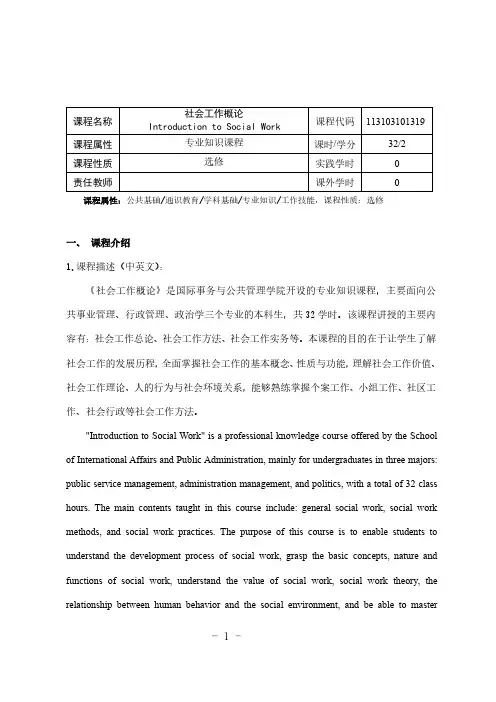
课程名称社会工作概论Introduction to Social Work课程代码113103101319课程属性专业知识课程课时/学分32/2课程性质选修实践学时0责任教师课外学时0课程属性:公共基础/通识教育/学科基础/专业知识/工作技能,课程性质:选修一、课程介绍1.课程描述(中英文):《社会工作概论》是国际事务与公共管理学院开设的专业知识课程,主要面向公共事业管理、行政管理、政治学三个专业的本科生,共32学时。
该课程讲授的主要内容有:社会工作总论、社会工作方法、社会工作实务等。
本课程的目的在于让学生了解社会工作的发展历程,全面掌握社会工作的基本概念、性质与功能,理解社会工作价值、社会工作理论、人的行为与社会环境关系,能够熟练掌握个案工作、小组工作、社区工作、社会行政等社会工作方法。
"Introduction to Social Work"is a professional knowledge course offered by the School of International Affairs and Public Administration,mainly for undergraduates in three majors: public service management,administration management,and politics,with a total of32class hours.The main contents taught in this course include:general social work,social work methods,and social work practices.The purpose of this course is to enable students to understand the development process of social work,grasp the basic concepts,nature and functions of social work,understand the value of social work,social work theory,the relationship between human behavior and the social environment,and be able to master-1-social work methods such as case social work,group social work,community social work, and social work administration.2.设计思路:本课程引导学生在对《社会学》具有一定认知的基础上,掌握社会工作的概念、性质、功能的基础上,了解西方社会工作实践与专业社会工作的发展,理解社会工作价值与社会工作专业伦理,能够运用社会工作理论指导社会工作实务,探索社会工作的过程。

社会工作导论第三版课程说明课程名称:社会工作导论第三版课程简介:社会工作导论第三版是一门介绍社会工作基本概念、理论、方法和技巧的课程。
本课程旨在帮助学生了解社会工作的历史、发展现状和未来趋势,掌握社会工作的基本理论和方法,以及如何运用社会工作技巧解决实际问题。
通过本课程的学习,学生将能够具备初步的社会工作实践能力,为今后从事社会工作或相关领域的工作打下坚实的基础。
课程目标:1. 掌握社会工作的基本概念、理论和方法;2. 了解社会工作的历史、发展现状和未来趋势;3. 学会运用社会工作技巧解决实际问题;4. 培养学生对社会工作的兴趣和热情,提高其社会责任感和职业素养。
课程内容:1. 社会工作的基本概念、原则和价值观;2. 社会工作的历史和发展现状;3. 社会工作的基本理论和方法;4. 社会工作技巧在实际中的应用;5. 社会工作与相关领域的联系与区别。
教学方式:本课程采用线上和线下相结合的教学方式,包括课堂讲解、案例分析、小组讨论、实践操作等多种形式。
学生需按时完成作业,积极参与课堂讨论,并参加社会实践活动,以加深对课程内容的理解和掌握。
课程考核:本课程的考核方式包括平时成绩和期末考试两部分。
平时成绩主要考察学生的出勤率、课堂表现、作业完成情况等;期末考试则主要考察学生对课程内容的掌握程度和应用能力。
综合平时成绩和期末考试成绩,最终确定学生的课程成绩。
总之,社会工作导论第三版课程是一门综合性、应用性较强的课程,旨在帮助学生掌握社会工作基本理论和方法,提高其解决实际问题的能力。
通过本课程的学习,学生将能够更好地适应社会发展需要,为社会做出更大的贡献。
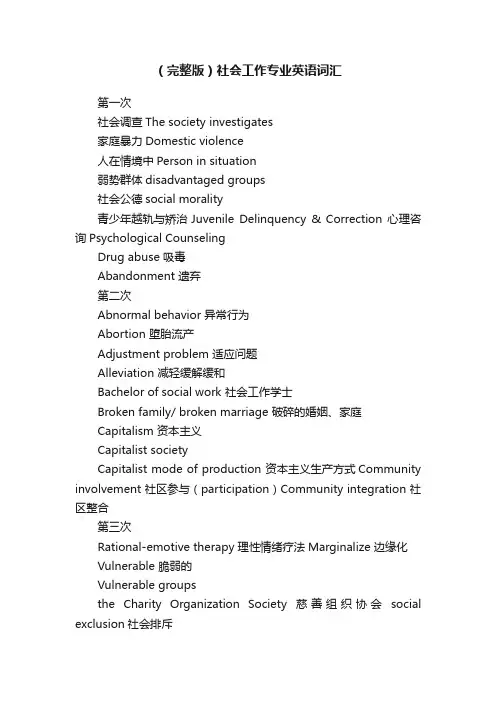
(完整版)社会工作专业英语词汇第一次社会调查The society investigates家庭暴力Domestic violence人在情境中Person in situation弱势群体disadvantaged groups社会公德social morality青少年越轨与矫治Juvenile Delinquency & Correction 心理咨询Psychological CounselingDrug abuse 吸毒Abandonment 遗弃第二次Abnormal behavior 异常行为Abortion 堕胎流产Adjustment problem 适应问题Alleviation 减轻缓解缓和Bachelor of social work 社会工作学士Broken family/ broken marriage 破碎的婚姻、家庭Capitalism 资本主义Capitalist societyCapitalist mode of production 资本主义生产方式Community involvement 社区参与(participation)Community integration 社区整合第三次Rational-emotive therapy 理性情绪疗法Marginalize 边缘化Vulnerable 脆弱的Vulnerable groupsthe Charity Organization Society慈善组织协会social exclusion社会排斥social integration社会融合social assistance社会救助social security社会保障rate of unemployment失业率第四次Role conflict 角色冲突Role ambiguity 角色模糊Stimulate 刺激Inherent 固有的Incompatible 不相容的Appropriate 占用;合适的Collaboration 合作Therapist 理疗学家Tolerate 忍受Filial piety 孝道第五次Financial assistance 经济援助Feminist 女权主义者Feminism女权主义Fertility 生育Fertility policy生育政策Fertility rate 生育率Formal-recourses system 正规资源系统Pension 养老金退休金Fund-raising activity 筹款活动Genetic theory 基因理论Compensation 赔偿Primary election 初选General election 大选Democratic party 民主党Republican party 共和党第六次Constitutional 宪法的,符合宪法的The Conservative Party 保守党The Labor Party 工党Gross domestic product 国内生产总值Enhancing security 提高保障水平Household income 家庭收入Economic shock 经济冲击Human capital 人力资本Public sector 公共部门Public health 公共健康第七次Help-seeking process 求助过程Hearing-loss 失聪Home for the aged 老人院安老院Home-based rehabilitation service 家居康复服务Human nature 人性Innovative 创新的Innovation 创新Intellectual capacity 智力World Trade Organization 世界贸易组织Intervention strategy 干预策略第八次Interview schedule 面谈程序Interpersonal interaction 人际互动Intimacy 亲密Isolation 孤单Intolerance 不容忍Juvenile 青少年Juvenile delinquency 青少年犯罪Liberal democracy 自由民主制Malnutrition 营养不良Manifest behavior 外显行为第九次Negotiation 协商交涉Neighborhood 邻居Parents association 家长会Parenting skills group 父母技巧小组Peer supervision 同辈督导Personality disorder 人格障碍Physical abuse 身体虐待Pleasure principle 享乐原则Policy implementation 政策实施政策执行。

社会工作导论知识点汇总社会工作导论(重点)第一章:社会工作概述1.什么是社会工作(由一般定义—社会工作是一个专业—中美界定)①社会工作是由英文socialwork翻译而来,基本内涵是指在一定的社会福利的框架下,根据一定的价值观念,帮助有困难的人走出困境的职业活动。
②是在遵循助人自助的价值理念的指导下,运用个案、小组、社区,行政等专业工作方法,以帮助机构和他人发挥自身潜能、协调社会关系、解决和预防社会问题,促进社会公正为职业的一项专业性的工作。
③社会工作是一个专业,在一个国家和地区表现为:在社会福利体系中,机构有从事合法的社会服务的专业资格;从事社会工作的人是经过社会工作的专业培训的;社会工作体系已经成为社会福利制度中的重要的组成部分。
④美国是最早开展社会工作专业教育的国家,其普遍接受的定义:社会工作是一种帮助个人、小组、社区增强或恢复社会功能并创造有利于实现这一目标的条件的专业活动。
而我国于1991年给出定义:社会工作是帮助人和解决社会问题的工作。
此外,我国社会工作不仅包括社会福利、社会保险和社会服务,还包括移风易俗等社会改造方面的工作。
2.简述社会工作是一个专业(解释专业—从学科、职业上—国家、地区表现)①社会学家帕森斯认为作为一个专业应表现为:执行这些功能的机构由一批有专业资格的人组成,他们经过专门训练,精通该学科的主要内容,使用专业的方法与技术。
他们适应社会需要,在社会上起着专门的作用、担负职责,享受优惠。
②学科上来说,社会工作是以科学知识为基础的应用型的社会科学,社会工作属于社会学(一级学科)下的二级学科。
职业上来说,社会工作脱胎于早起的慈善事业,但随着受助人情况的复杂化和现代社会对受助人正当权利要求,组成社会工作专业团体成为必要。
③社会工作是一个专业,在一个国家、地区表现为:在社会福利体系中,机构有从事合法的社会服务的专业资格;从事社会工作的人是经过社会工作的专业培训的;社会工作体系已经成为社会福利制度中的重要的组成部分。

社会工作导论笔记社会工作是基于“person in environment”的框架,协助个人与自己、他人及其他场景因素,建立良好关系的专业和职业。
第一章人类需要和贫穷第一节人类需要需要一般指生存发展的必要条件。
社工定义——需要是为了生存、幸福和完善而体现的胜利、心理、经济、文化和社会条件。
有普通需要(common needs)和特殊需要(special needs)之分一、普通需要/共同需要(common needs)▲需要层次说马斯洛①自我实现尊重归属和爱安全生理②某些需要比其他需要更基本③按特定次序满足需要,由低到高;在某些情况下,不同需要不一定按层次高低排序,多个层面需要也可能同时发生▲整体需要说佩尔曼①生理、心理、社会三个角度②三者合一③作为生理和生物的人,人会根据过去的体验、现在的状况和将来的预期,借助人际联系和社会环境中的生活模式寻求需求的满足▲阶段性需求说托尔①在不同年龄段,人们的普通需要不同生存需要:衣食住行普通需要:A)婴儿及儿童阶段B)青少年C)成年D)老年二、特殊需要▲个体差异:个人的生物、生理、社会和文化方面的不同,影响需求的表达和满足方式最重要的人际差异:性别年龄宗教种族生理心理性倾向社会经济地位人际差异的存在使普遍需要在不同个体身上体现为特殊需要▲需求差异:1)人类共同需要在个体上的不同体现2)个人需要是普遍需要和个体差异的结果三、社会引发的需要(非主观因素)即由社会因素引发的从而诸多个人所具有的个人需要福利是需要满足的状态,社会福利是社会需要手段的满足人类需求及其满足界定了社会工作的目标和主体,是社会工作的核心,是研究社会行政、福利服务、计划和资源分配的基础四、需要测量四种方式:A规范性需要B感受性需要C表达性需要D比较性需要第二节贫穷贫穷的定义:贫穷就是缺乏获得食物、参与活动、拥有生活条件和环境等方面的资源(汤森)包括非常少的收入和其他状况,如缺少获得基本服务的途径、缺少保障、被排除参与社区生活等贫穷分类:A相对贫穷:①依赖与主观②贫穷标准变化社会成员之间、地区差异B标准性贫穷:某些群体无论物质状况和收入如何,都被界定为贫穷C绝对贫穷:依食物消费划分,标准最难确定贫穷模型:A生存模型:维持生活和健康必需的食物不足和没有住处,较严重的生理需求不足、饮食营养不假、疾病,缺衣少药B营养标准模型:按照最低热量需求计算食物最低成本C收入不公模型:个体在收入群体中的相对位置D相对剥夺模型:由于资源和机会分配不当,某些人所享资源和机会低于平均水平贫困线:含义:是界定个人和家庭的生活资金和资源的标准线制订方法:A市场菜篮法B食费对比法(恩格尔系数)C生活形态法D国际贫困线(最公平、有效和高参与)制订原则:公平、效率和参与关于贫穷的理论:A贫穷文化论:人因文化、价值观、道德等贫穷B社会达尔文主义:适者生存贫穷源于自身(尤其是懒惰)C社会结构论:社会短缺和困难导致需要不足→社会引发的需要D人环两因论:个人原因——不能、不为、无准备、不守规矩环境原因——经济(最重要)、社会、政治、自然/人为灾难贫穷成因与对策:成因:个人因素、社会因素(知识经济导致贫富对立)、事件因素、结构性(低廉工作、疾病与老年、资源分配等个人无法控制的条件,eg产业结构调整导致下岗)对策:①改变环境——增加投资(淌滴理论)、资源再分配(税收)、社区工作、社会行政、社会政策等②改变个人——个案工作、小组工作等第二章社会工作的定义与架构基本内涵:定义:福利部门和服务机构针对个人、团体(家庭或小组)、社区、组织、社会等与其外在环境的不当互动而形成的若是情况,利用专门的方法和技术,协助当事人改变或推动环境的改变,促进两者的适应性平衡。
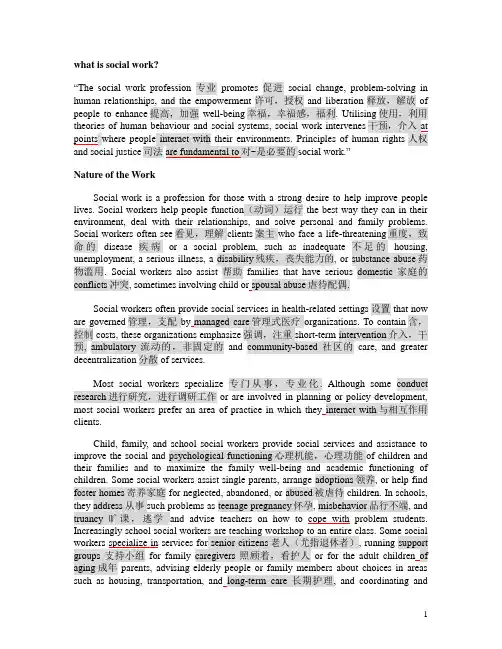
what is social work?“The social work profession专业promotes促进social change, problem-solving in human relationships, and the empowerment许可,授权and liberation释放,解放of people to enhance提高,加强well-being幸福,幸福感,福利. Utilising使用,利用social systems, social work intervenes干预,介入atpeople interact with their environments. Principles of human rights人权司法 are fundamental to对~是必要的social work.”Nature of the WorkSocial work is a profession for those with a strong desire to help improve people lives. Social workers help people function(动词)运行 the best way they can in their environment, deal with their relationships, and solve personal and family problems. Social workers often see看见,理解 clients案主 who face a life-threatening重度,致命的disease疾病or a social problem, such as inadequate不足的housing, unemployment, a serious illness, a disability残疾,丧失能力的, or substance abuse药物滥用. Social workers also assist帮助families that have serious domestic家庭的conflicts冲突, sometimes involving child or spousal abuse虐待配偶.Social workers often provide social services in health-related settings设置 that now are governed管理,支配 by managed care管理式医疗 organizations. To contain含,控制 costs, these organizations emphasize强调,注重 short-term intervention介入,干预, ambulatory流动的,非固定的and community-based社区的care, and greater decentralization分散 of services.Most social workers specialize专门从事,专业化. Although some conduct research进行研究,进行调研工作 or are involved in planning or policy development,most social workers prefer an area of practice in whichclients.Child, family, and school social workers provide social services and assistance to improve the social and psychological functioning心理机能,心理功能 of children and their families and to maximize the family well-being and academic functioning of children. Some social workers assist single parents, arrange adoptions领养, or help find foster homes寄养家庭 for neglected, abandoned, or abused被虐待 children. In schools, they address从事such problems as teenage pregnancy怀孕, misbehavior品行不端, and truancy旷课,逃学and advise teachers on how to cope with problem students. Increasingly school social workers are teaching workshop to an entire class. Some social workers specialize in services for senior citizens老人(尤指退休者), running support groups支持小组for family caregivers照顾着,看护人or for the adult children of aging成年parents, advising about choices in areassuch as housing, transportation, and coordinating andmonitoring these services. Through employee assistanceprograms, they may help workers cope with job-related pressures or with personal problems that affect the quality of their work. Child, family, and school social workers typically典型的 work for individual and family services agencies, schools, or State or local governments. These social workers may be known as child welfare儿童福利 social workers, family services social workers, child protective保护的services social workers, occupational social workers, or gerontology老年学 social workers.Medical and public health公共卫生social workers provide persons, families, or vulnerable易受伤害的 populations with the psychosocial社会心理的 support needed to cope with chronic长期的,慢性的, acute严重的, or terminal illnesses终期病患,晚期疾病, such as Alzheimer's disease早老性痴呆, cancer, or AIDS. They also advise family caregivers照顾者, counsel建议,劝告patients, and help plan for patients’ needs after discharge后放by arranging for at-home services, from meals-on-wheels to oxygen equipment. Some work on interdisciplinary跨领域的teams that evaluate评价,评估certain kinds of patients—geriatric老年病人 or organ transplant器官移植 patients, for example. Medical and public health social workers may work for hospitals, nursing护理,看护 and personal care facilities, individual and family services agencies, or local governments.Mental health and substance abuse药物滥用social workers assess and treat individuals with mental illness精神病 or substance abuse problems, including abuse of alcohol, tobacco烟草, or other drugs. Such services include individual and group therapy 治疗,疗法, outreach延伸,扩广, crisis intervention危机干预,危机介入, social rehabilitation复原, and training in skills of everyday living. They also may help plan for supportive services to ease减轻 patients and return to the community. Mental health and substance abuse social workers are likely to work in hospitals, substance abuse treatment centers, individual and family services agencies, or local governments. These social workers may be known as clinical临床的social workers. (Counselors辅导员,顾问and psychologists, who may provide similar services.)Other types of social workers include social work planners and policymakers, who develop programs to address such issues as child abuse, homelessness, substance abuse, poverty贫困, and violence. These workers research and analyze policies, programs, and regulations条例,规程. They identify social problems and suggest legislative立法机构and other solutions. They may help raise funds or write grants to support these programs. Job Outlook展望求services often is highest and training programs训练计划forprevalent流行的,普遍的. However, opportunities should be good in rural areas, which often find it difficult to attract and retain保持,保留 qualified合格的,能胜任的 staff. By specialty专业,专长, job prospects前景 may be best for those social workers with abackground in gerontology老年医学 and substance abuse treatment.occupations through 2014. The rapidly growing elderly population and theboom generation生育高峰年 will create greater demand for health and social services, resulting in particularly rapid job growth among gerontology老年医学social workers. Many job openings职位空缺 also will stem from出于,来自 the need to replace social workers who leave the occupation.As hospitals continue to limit the length of patient stays, the demand for social workers in hospitals will grow more slowly than in other areas. Because hospitals are releasing释放 patients earlier than in the past, social worker employment in home health care services is growing. However, the expanding扩大的 senior年老的 population is an even larger factor. Employment opportunities for social workers with backgrounds in gerontology should be good in the growing numbers of许多,若干 assisted -living and senior-living communities. The expanding senior population also will spur demand for social workers in nursing homes, long-term care facilities, and hospices济贫院.Strong demand is expected for substance abuse social workers over the 2004? 4 projection规划 period周期,时期. Substance abusers are increasingly being placed into treatment programs instead of being sentenced to判决 prison. Because of the increasing numbers of individuals sentenced to prison or probation缓刑 who are substance abusers, correctional 矫正的systems are increasingly requiring substance abuse treatment as a condition added to their sentencing量刑 or probation试用. As this trend grows, demand will increase for treatment programs and social workers to assist abusers on the road to在~过程中Employment of social workers in private social service agencies also will increase. However, agencies increasingly will restructure调整,重改结构 services and hire more lower paid social and human service assistants instead of social workers. Employment in State and local government agencies may grow somewhat in response to响应,对~有反应 increasing needs for public welfare社会福利,公共福利, family services, and child protection services; however, many of these services will be contracted out包出,批给外界承办to private agencies. Employment levels in public and private social services agencies may fluctuate波动,涨落, depending on need and government funding资金,经费 levels.Employment of school social workers also is expected to grow as expanded efforts to respond to rising student enrollments and continued emphasis on integrating整合disabled children into the general school population lead to more jobs. There could be competition for school social work jobs in some areas because of the limited number of openings. The availability有效性,可用性 of Federal, State and local fundingwill be a major factor in determining the actual job growth in schools.Opportunities for social workers in private practice私人机构will expand, but growth may be somewhat hindered阻碍,妨碍 by restrictions that managed care 管理式医疗organizations put on增加mental health services. The growing popularity of employee assistance programs is expected to spur demand for private practitioners, some of whom provide social work services to corporations on a contractual合同的,契约的basis. However, the popularity of employee assistance programs will fluctuate波动,涨落with the business cycle商业周期, because businesses are not likely to offer these services during recessions衰退.。
社会工作导论——《社会工作导论》第一章总结社会工作导论(第一章)第一节社会工作的意义及其分类1.社会工作概念的内涵国际上关于社会工作的三种认识,将社会工作视为个人慈善事业,将社会工作视为由政府或和国际私人团体举办的以解决各种因经济困难所导致的问题为目的的各种有组织的活动,将社会工作视为由政府或私人社团所举办的专业服务。
2.专业意义上的社会工作(1)社会工作是一种助人活动。
(2)社会工作是一种主人过程。
(3)社会工作是一种助人方法。
(4)社会工作是一种专业。
(5)社会工作是一种制度。
(6)对社会工作的综合定义。
3.社会工作的分类按社会工作的方法进行分类(1)社会个案工作(social case work):以个人及单个家庭为对象的一种社会工作方法。
(2)社会群体工作(social group work):以一群人、团体或社团为对象的一种社会工作方法,也称社会群体工作。
(3)社区工作(community organization and community development):以一群人共同生活的地区即社区为对象的一种社会工作方法。
(4)社会行政(social administration):主要以行政的方法与程序,通过制定和执行社会政策推进社会工作的一种方法。
按社会问题的性质进行分类即将社会工作者职责范围之内的社会问题做出划分。
社会问题包罗万象。
但通常被社会工作者认定为其职责所在的社会问题主要有:贫穷问题,失业问题,疾病问题,婚姻、家庭问题,儿童问题,老年问题,身心残障问题,吸毒问题,酗酒问题,犯罪问题,劳工问题,种族歧视问题等。
按社会工作的对象进行分类一般而言,按社会工作所涉及的对象,可分为儿童社会工作、老年社会工作、妇女社会工作、贫民救助工作、伤残服务工作、劳工福利工作、农民福利工作、患者社会工作、社会越轨者工作等。
按社会工作的方式(媒介)进行分类(1)家庭式:包括儿童寄养、儿童家庭补助、家庭服务等。
Is Maslow’s hierarchy of needs theory applicable in today’ssocial work? And why?Maslow’s Hierarchy of Needs is a motivational theory in psychology that argues that while people aim to meet basic needs, they seek to meet successively higher needs in the form of a hierarchy. It is often portrayed in the shape of a pyramid. The lowest levels of the pyramid are made up of the most basic needs, while the more complex needs are located at the top of the pyramid. Maslow's theory suggests that the need for self-actualization, that is, the need that human beings have to realize their full potential, can only be fulfilled once other needs have been met. Self-actualization describes an inborn tendency for human beings to grow and to maximize innate talents and potentialities.According to Maslow, the first level includes basic physiological needs for food, shelter, clothing, and so on. Once these needs have been met, the actualization process creates a momentum for the next level of needs to be realized, namely, for security and safety and to feel free from danger. Again, once these have been met, there is an innate motivation to move on to the next stage, and so forth.Although Maslow’s concept is meaningful to our social work, there are still some criticisms. Some have noted vagueness in what is a “deficiency”; what is a deficiency for o ne is not necessarily a deficiency for another. Secondly, there seem to be various exceptions that frequentlyoccur. For example, some people often risk their own safety to rescue others from danger. In their extensive review of research based on Maslow's theory, Wahba and Brudwell found little evidence for the ranking of needs Maslow described or even for the existence of a definite hierarchy at all. Chilean economist and philosopher Manfred Max-Neef has also argued fundamental human needs are non-hierarchical and invariant in nature—part of the condition of being human; poverty, he argues, may result from any one of these needs being frustrated, denied or unfulfilledThe order in which the hierarchy is arranged has been criticized as being ethnocentric by Geert Hofstede. Hofstede's criticism of Maslow's pyramid as ethnocentric may stem from the fact that Maslow’s hierarchy of needs neglects to illustrate and expand upon the difference between the social and intellectual needs of those raised in individualistic societies and those raised in collectivist societies. Maslow created his hierarchy of needs from an individualistic perspective, being that he was from the United States, a highly individualistic nation. The needs and drives of those in individualistic societies tend to be more self-centered than those in collectivist societies, focusing on improvement of the self, with self actualization being the apex of self improvement. Since the hierarchy was written from the perspective of an individualist, the order of needs in the hierarchy with self actualization at the top is not representative of theneeds of those in collectivist cultures. In collectivist societies, the needs of acceptance and community will outweigh the needs for freedom and individuality.Maslow’s hierarchy has also been criticized as being individualistic because of the position and value of sex on the pyramid. Maslow’s pyramid puts sex on the bottom rung of physiological needs, along with breathing and food. It views sex from an individualistic and not collectivist perspective. This view of sex neglects the emotional, familial and evolutionary implications of sex within the community.As Hayes said, Maslow’s model may provide a rough w orking generalization about most people in most situations, but it is not really adequate as an explanation of human motivation.It seems that a lot of social work principles are based on this pyramid; I would argue that most of the other helping professions only work at the top three rungs of the pyramid. Social workers often find themselves starting at the bottom two.While Maslow’s theory is useful, it is of course an oversimplification of real life, especially when you consider that a lot of human beings would rearrange this pyramid in one way or another. For example, a lot of people may feel that this pyramid should be arranged with self-esteem as the bottom rung. They may feel that once a person has achieved a modicum of self esteem, that everything else will fall intoplace, including the ability to take care of basic needs. I agree with that in principle.But a large percentage of social work stops at the bottom two rungs, with the remainder being taken care of by a referral to a professional who handles those parts of the pyramid.The question is what we can do as social workers to encourage a client to move up the pyramid. For example, a lot of people at the shelter do indeed stop at the first two rungs; they get stuck in a cycle in which they do leave the shelter either by being kicked out or getting assisted with housing, but somehow end up back at the bottom of the pyramid again. For whatever reason, is it trauma, poor life skills in general, or a bad example while growing up, they never can seem to get out of this cycle. And ethically, we can’t force them to.Is it a dependency issue, that is, do they prefer to be in this cycle? Or are their mental health issues so severe that they just can’t get out of the cycle? If so, why are there not better resources for handling these issues? It seems to not make any sense to provide for just the basic needs and stop there. The goal should be to allow clients to move farther up the pyramid, and to have the resources to do that. If not, our society is just perpetuating the problem by creating dependency when it comes to a person’s basic needs.So in social work we often encounter situations where if appearsvery difficult for some individuals to move their lives forward beyond the first two levels. The energy spent on trying to survive in the face of adversity necessarily means that emotional resources or energy are not free to be used on other courses of action, such as finding a job, sorting out school problems or meeting other needs. This has important implications for our work because it could mean that providing the right kind of practical or material assistance, or emotional support for service users, could release the momentum and motivation towards self-sufficiency and independence. Without this understanding, we run the risk of providing resources and services into a bottomless pit, where fundamental change does not happen.To conclude, although this theory has serious limitations, there is no doubt that Maslow’s hierarchy of needs theory is still applicable in today’s social work. I think what our social worker should do is to understanding this theory well and try our best to adapt it into our daily work. There must be a wide gap between theory and practical operation, which need us to consummate and find the balance through our experience.。
个案社会工作导论里士满读后感英文版Reflections on "Introduction to Case Social Work: The Richmond Perspective"Upon completing the reading of "Introduction to Case Social Work: The Richmond Perspective," I found myself deeply immersed in the intricate world of social work, specifically the个案社会工作的艺术和科学. The book, authored by the esteemed Lishiman, offers a comprehensive yet accessible introduction to the field, guiding readers through the fundamental principles and practices of case social work.The book begins by defining the essence of case social work, explaining its purpose and the unique role it plays in society. It then delves into the core competencies required for effective practice, including empathy, active listening, problem-solving, and more. Each chapter ispacked with insights, examples, and strategies that bring these concepts to life.One of the most striking aspects of the book is its emphasis on the importance of relationship-building in social work. Lishiman underscores the fact that successful social workers are not just technicians or administrators, but are also skilled in building trust and maintaining meaningful relationships with their clients. This relational approach is crucial in understanding the complexities of clients' lives and in developing effective interventions.The book also highlights the ethical dimensions of social work, reminding us that while techniques and strategies are important, they must always be guided by a strong ethical compass. Lishiman reminds us that social workers have a responsibility to uphold the dignity and rights of their clients, ensuring that their interventions are not only effective but also just and fair.As I reflected on the contents of the book, I realized that it is not just a textbook; it is a roadmap for anyone interested in making a difference in people's lives. The principles andpractices outlined in "Introduction to Case Social Work: The Richmond Perspective" are not just theoretical; they are actionable, and can be applied in real-world settings to bring about positive changes in individuals and communities.In conclusion, "Introduction to Case Social Work: The Richmond Perspective" is a must-read for anyone interested in understanding and practicing social work. It is a comprehensive guide that covers the basics of the field while also delving into the more nuanced aspects of relationship-building, ethics, and effective practice. It leaves me with a renewed sense of purpose and inspiration to pursue social work as a career and to make a positive impact in the lives of those who need it most.中文版《个案社会工作导论:里士满视角》读后感读完《个案社会工作导论:里士满视角》后,我深感自己已深深沉浸在社会工作的纷繁复杂的世界中,尤其是个案社会工作的艺术和科学。